by Evie Hunter | Dec 9, 2022
Hey everyone, my name is Evie Blount and I am the Gadsden County 4-H Extension Agent. I started this position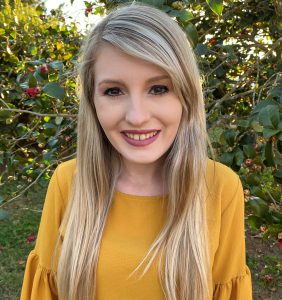 in January of 2020, just before the COVID-19 pandemic started. This is just one of the few hurdles that I had to jump over and just kept running. With everything switching to a virtual format, I worked with other agents from all over Florida to help create the Virtual Poultry and Rabbit Summer Camp and the Florida Virtual Ag Judging Contest. Both of these programs have been very successful and I have enjoyed watching them grow. This job has been super rewarding and I love getting to work with the youth and volunteers in my community.
in January of 2020, just before the COVID-19 pandemic started. This is just one of the few hurdles that I had to jump over and just kept running. With everything switching to a virtual format, I worked with other agents from all over Florida to help create the Virtual Poultry and Rabbit Summer Camp and the Florida Virtual Ag Judging Contest. Both of these programs have been very successful and I have enjoyed watching them grow. This job has been super rewarding and I love getting to work with the youth and volunteers in my community.
Since becoming the Gadsden County 4-H Agent, I have done a lot of work with Animal Science that I am extremely proud of. One of them being the Animal Science Camp that I helped teach over the Summer. This program was taught as a Statewide Virtual Summer Camp and used to teach day camps in Wakulla, Gulf, Calhoun, and Gadsden Counties. This program has been a lot of fun and the youth really enjoy it.
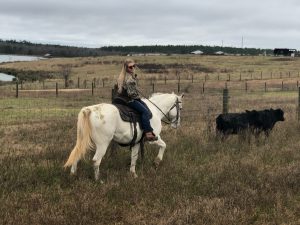 4-H has been my home since I was 8 years old. During my life as a 4-H youth I showed rabbits, chickens, and steers in the Livestock Club and competed in livestock judging and public speaking contest. I also attended Camp Timpoochee and Horse Camp during the Summer as a camp counselor. After graduating from the Gadsden County 4-H Program, I continued to help out the Livestock Club at the North Florida Fair and at the West Florida Livestock Show. Little did I know that I would one day become the 4-H Agent in my county.
4-H has been my home since I was 8 years old. During my life as a 4-H youth I showed rabbits, chickens, and steers in the Livestock Club and competed in livestock judging and public speaking contest. I also attended Camp Timpoochee and Horse Camp during the Summer as a camp counselor. After graduating from the Gadsden County 4-H Program, I continued to help out the Livestock Club at the North Florida Fair and at the West Florida Livestock Show. Little did I know that I would one day become the 4-H Agent in my county.
by Heather Kent | Dec 9, 2022
 While the holiday season can be a wonderful time, it can also be busy and stressful. We have several tools and ideas to help you be stress-free this year so you can fully enjoy your time with family and friends. Below are quick links to some of our most read and rated articles. Hopefully one or two of these will be just what you need this time of year!
While the holiday season can be a wonderful time, it can also be busy and stressful. We have several tools and ideas to help you be stress-free this year so you can fully enjoy your time with family and friends. Below are quick links to some of our most read and rated articles. Hopefully one or two of these will be just what you need this time of year!
Holiday Savings
- Managing the Holidays without Breaking the Bank– this article includes five practical strategies, and even includes step-by-step directions for some homemade gifts.
- Christmas Memories Gifts in a Jar– Make memories with your kids or grandkids (and save some money) by crafting gifts in a jar. This article includes some creative ideas and step-by-step instructions
Holiday Health (Physical & Mental)
- Three ways to Incorporate Mindfulness During the Holidays– this article shares three steps to using mindfulness as a way to mitigate the stress of the season.
- Handling the Holiday Blues– The holidays can be hard- especially if you are experiencing loss. If you or a loved one has the Holiday Blues, this article has eight helpful tips to make this time a little bit easier.
- Healthy Holiday Meals– This article includes ideas for making your favorite holiday dishes a little healthier.
Holiday Fun
- Including Youth in Holiday Traditions– some great ideas for sharing your favorite holiday traditions with youth (or creating new ones)
- Pin a Holiday Memory with Homemade Magnets– this article gives step-by-step instructions on creating magnets to represent your favorite holiday memories (past and present).
by Rachel Pienta | Dec 9, 2022
What is a Youth-Adult Partnership?
“Youth-adult partnership” is a frequently used phrase among 4-H leaders, volunteers, and members. Volunteer club leaders are encouraged to foster youth-adult partnerships in the community club environment. What is a youth-adult partnership? How would a volunteer club leader begin to create this type of partnership? What is the adult role in the youth-adult partnership? Research shows that “caring, knowledgeable, and skilled adults can contribute to the success of young people as they grow and develop (Norman and Jordan, 2006). The first step in creating a youth-adult partnership is being the adult who wants to foster that environment in their 4-H club.
Positive Youth Development
4-H programs are built on a Positive Youth Development foundation. To further unpack what that phrase means, let’s begin with defining youth development. Norman and Jordan (2006) define “Youth development as an ongoing process through which young people attempt to meet their needs and to develop the competencies they perceive as necessary for survival and transition to adulthood.” When youth development is positive, this development has positive benefits and outcomes for the youth and the community. While youth development is a youth-focused process experienced by the youth, adults can and do play a role in this process. Adult leaders have the unique and special role of creating environments that provide opportunities to develop and grow in positive ways.
Zone of Proximal Development and the Role of the Adult Leader
Sociologist Lev Vygotsky studied how children learn and acquire skills. Through his research, he was able to determine that children can develop and learn to a certain point based on prior experience and knowledge. With the help of an adult teacher or leader, the child can learn more and acquire skills beyond what he or she might be able to accomplish without adult help. This learning theory is known as the “Zone of Proximal Development” (Vygostky, 1978). In 4-H, reaching the zone of proximal development where the youth-adult partnership empowers youth members to achieve is the goal we work to reach.
Working with Youth as Partners
The origin of today’s 4-H youth-adult partnership model is rooted in the work of sociologist William Lofquist. Lofquist (1989) developed the “Spectrum of Attitudes” to describe adult attitudes and approaches to working with youth. The Spectrum of Adult Attitudes places attitudes towards young people into three categories: Youth as objects; Youth as recipients; and Youth as partners (Williams, 2016). Lofquist noted that adult attitudes and the behaviors that result from these attitudes were not necessarily linear or clear cut. Youth needs may drive adult behaviors at different points in the learning and partnership process. In 4-H, adult leaders strive to transition youth from being knowledge recipients to being partners in learning and doing.
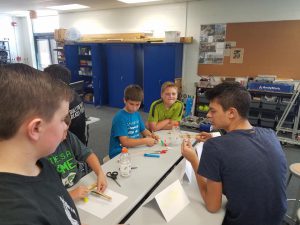
High school-age 4-H youth members plan and lead a 4-H robotics club.
Getting Started
Adults can foster and support successful youth-adult partnerships by creating and “providing environments for youth that are safe and nurturing and by expanding opportunities for experiences that will help young people develop skills they need for adulthood” (Norman and Jordan, 2006).
The idea of moving from an adult-led club to a club that operates as a youth-adult partnership may seem intimidating. Where do we start? How does it work? Volunteer club leaders may find that it takes a while to develop a community club that functions as a successful youth-adult partnership. Adults and youth may learn together as adults yield control and youth step into expanded leadership roles.
Tips for Establishing a Youth-Adult Partnership
In the club setting, creating space for shared decision-making can help build the youth-adult partnership. When adults make decisions “with” rather than “for” youth, space is created for youth voices to be heard, for youth decisions to be validated, and for youth to develop as leaders.
When youth make decisions about activities and projects, they begin to have ownership over the club experience and move toward acting as fully empowered partners with adult leaders.
How can adults create an environment that gives youth space to develop and grow as partners? Adult leaders can start building the youth-adult partnership by helping youth develop key skills to lead and run club meetings. Steps to reaching an effective youth-adult partnership include the following activities:
- Electing youth officers and providing officer training.
- Providing whole club training in parliamentary procedure with meeting procedure practice.
- Agenda planning that includes youth and adults.
- Adults joining youth-led meetings as participants.
- Setting ground rules so that everyone is heard and respected
Getting Started
For more information and resources on 4-H clubs and youth-adult partnerships, reach out to your local Extension office or 4-H agent.
We also have several tools and resources for office training, parliamentary procedure games, and agenda planning on our Northwest 4-H Volunteer Google Site. If you would like some hands-on training, make plans to attend our Northwest 4-H Volunteer Forum January 20-21 in Destin, Florida. Registration is available on 4HOnline
References
Lofquist, W. 1989. The technology of prevention workbook: A leadership development program. Tucson, AZ: Associates for Youth Development Publications.
Norman, M.N. and Jordan, J.C. 2006. Introducing 4-H youth development. EDIS 4HFFS101.2, one of a series of the 4-H Youth Development Department, UF/IFAS Extension. Original publication date February 2006. Reviewed July 2018. Visit the EDIS website at http://edis.ifas.ufl.edu.
Vygotsky, L. 1978. Interaction Between Learning and Development. In Gauvain & Cole (Eds.) Readings on the Development of Children. New York: Scientific American Books. pp. 34-40
Williams, C.D. 2016. What is authentic youth engagement? The Governor’s Office for Children. Maryland.gov. https://goc.maryland.gov/authentic-youth-engagement/.
Additional Resources
A 4-H Club Meeting
4-H Club Management
4-H Clubs that Youth Choose to Attend
Running a Smooth 4-H Business Meeting
by Claire Davis | Nov 3, 2022
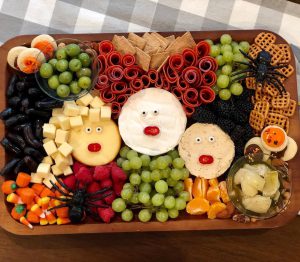 With the holiday season fast approaching, everyone’s favorite dishes will soon appear on the dinner table. Everyone has different taste buds, so that means everyone has different favorite dishes. I know that I am looking forward to sweet potato soufflé and deviled eggs, but I could definitely do without the cranberry sauce. Unfortunately, many parents find themselves in a bind trying to feed their picky eaters. Remember, you are not alone in this battle, and try not to get too frustrated by this typical behavior. This article includes some tips on what to avoid and strategies to help your favorite picky eater!
With the holiday season fast approaching, everyone’s favorite dishes will soon appear on the dinner table. Everyone has different taste buds, so that means everyone has different favorite dishes. I know that I am looking forward to sweet potato soufflé and deviled eggs, but I could definitely do without the cranberry sauce. Unfortunately, many parents find themselves in a bind trying to feed their picky eaters. Remember, you are not alone in this battle, and try not to get too frustrated by this typical behavior. This article includes some tips on what to avoid and strategies to help your favorite picky eater!
DO:
Eat family style. Trying sharing a meal together, as a whole family, as often as you can. This means sitting at a table and turning off the distractions like TV, radio, or cell phones at mealtime. When preparing for your family’s well-balanced meal, incorporate at least one food you know that your picky eater likes. Eating family style also allows for you to set a good example! That squash on your plate may not look appetizing to your picky eater, but if they see you try it, they may be more apt to as well!
Try, try again! Just because a picky eater refuses different foods once, doesn’t mean they won’t ever like it. Keep offering new foods and those your picky eater didn’t like before. It can take as many as seven times to taste food before your taste buds accept it. I can remember as a child disliking anything colored with green vegetables. This could have been salad, peas, green beans, lima beans, or another vegetable. As an adult, I have come to enjoy all of these vegetables and many more! If I had not tried them again, I still may not know if I like them or not.
Make food fun. There are many ways to accomplish this. Youth are typically open to trying foods arranged in eye-popping, creative ways. Make foods look irresistible by arranging them in fun, colorful shapes they can recognize. Finger foods and foods that you dip are also a big hit! Try involving your picky eater in meal planning and prep. Let them pick which fruit and vegetable to add to dinner, or pick them out at the grocery store. Read kid-friendly cookbooks together and let them pick out new recipes to try. Involve them in some of the cooking tasks, such as sifting, stirring, counting ingredients, or picking garden fresh herbs or vegetables.
Finding the right pair. When serving unfamiliar foods, pair the food with something that is familiar. Many picky eaters will not try broccoli alone, but if you add cheese to it, it becomes a whole new dish!
DON’T:
Fight over food. If your picky eater refuses to eat their meal, avoid making a hassle over it. It is important for individuals to learn to listen to their bodies, which will tell them when they are hungry or not. It is up to the adult to provide the food, and it is the other’s decision to eat. Pressuring them into eating, or punishing them if they don’t, can make them actively dislike foods they may otherwise have liked.
Bribes. This goes along with fighting over their food. While it may be tempting to bribe your picky eater to try something, this is not how food should be handled. Bribing to eat the “yucky” food makes the “prize” food that much more exciting. This can lead to future trouble at the dinner table.
Sources:
https://www.healthychildren.org/English/ages-stages/toddler/nutrition/Pages/Picky-Eaters.aspx
by Evie Hunter | Oct 21, 2022
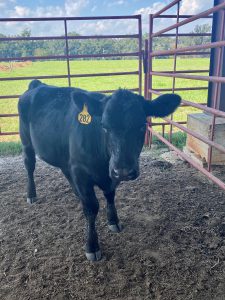 Happy fair season everyone! Fairs aren’t just about rides and food but also about participating in showing livestock, entering exhibits, and competing in judging contests. Judging contests are a great way for youth to explore a topic they are interested in, and practice decision-making and critical thinking skills. One of the most popular judging contests is agriculture judging. There is an agricultural judging contest online and at the North Florida Fair.
Happy fair season everyone! Fairs aren’t just about rides and food but also about participating in showing livestock, entering exhibits, and competing in judging contests. Judging contests are a great way for youth to explore a topic they are interested in, and practice decision-making and critical thinking skills. One of the most popular judging contests is agriculture judging. There is an agricultural judging contest online and at the North Florida Fair.
The Florida 4-H Virtual Ag Judging Contest will take place on October 27th at 6:00 pm EST on Zoom and it is free! There will be a training prior to the contest to allow 4-H youth an opportunity to learn about each topic before participating in the contest. The training will be held on October 25th at 6:00 pm EST on zoom. This contest is great for 4-H youth to learn how to judge steers, dairy cows, poultry, swine, hay, grain, peanuts, and tomatoes. There will also be questions on tool identification, weed identification, and soil samples. To participate in this contest youth must be 4-H age 8-18 and will need to register in 4-H Online. If you have any questions about this event, please email Evie Blount (ecb1224@ufl.edu) or Chris Decubellis (cdecube@ufl.edu). We had so much fun creating this contest virtually and are super excited for youth all over the state to participate! This is our 3rd year doing this contest and we are happy to see it grow!
The North Florida Fair Ag Judging Contest will take place on November 12th at the fairgrounds in Tallahassee, Florida. This contest will be covering judging steers, heifers, poultry, hay, and grains. This contest is for youth 4-H age 8-18 that are interested in learning how judge agriculture. To participate in this contest youth must be register in 4-H Online and contact your 4-H Agent to sign up. If you have any questions about this event, please email Robbie Jones r.jones1@ufl.edu or Evie Blount (ecb1224@ufl.edu).
If you are new to agriculture judging, below are some resources to help you prepare:
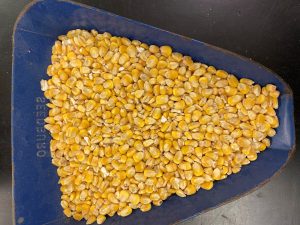
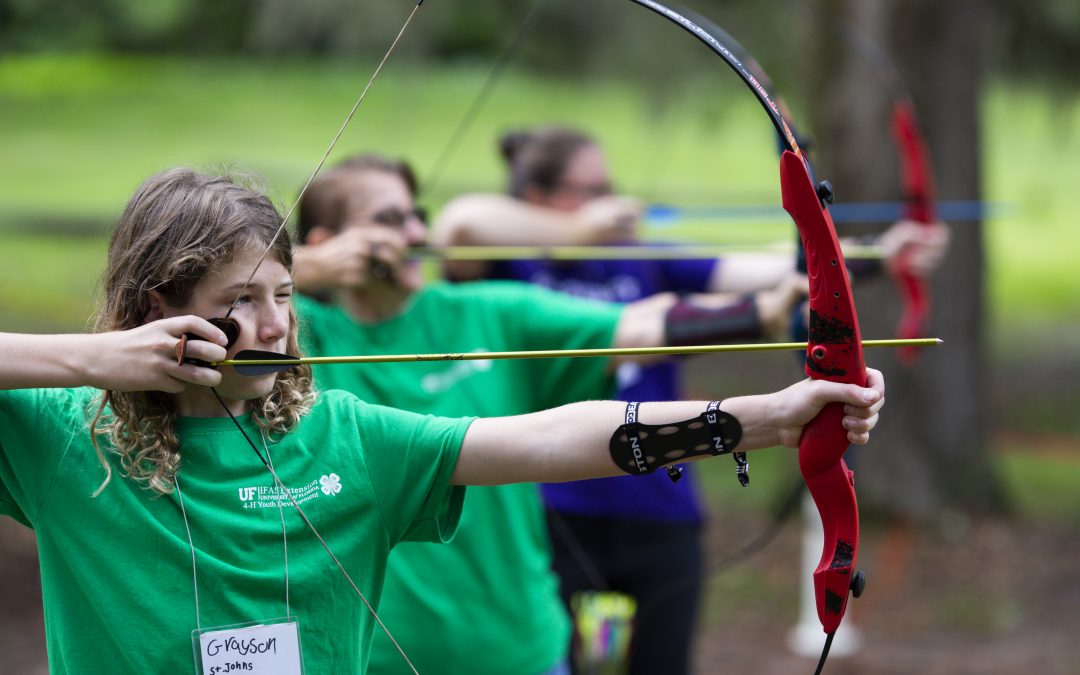
by aschortinghouse | Oct 12, 2022
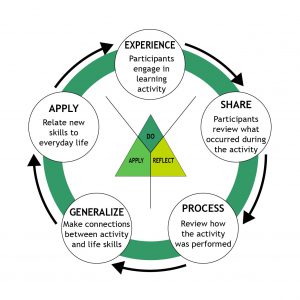
Figure One. The Experiential Learning Model. (Experiential Learning Model, 2022)
“Hands-on,” and “learn by doing” are terms you often hear in 4-H and they both refer to the Experiential Learning Model, which is the instructional strategy we use in 4-H programs. The hands-on experiences that 4-H is known for offer youth the chance to engage all their senses in the learning process. One of the prevalent models guiding hands-on experience design is the experiential learning model (Experiential Learning Model, 2022). Figure one illustrates this model, highlighting the three notable stages of doing, reflecting, and applying which serve as the core of the model. While the hands-on experience is critical, it is also important to remember that reflection and a focus on how to apply what was learned are also necessary for a compelling experience to result in impactful learning outcomes.
Designing for Experiential Learning
When designing programs, it is important to keep in mind that leaders must intentionally foster experiential learning through the careful planning and execution of programs. Three tips to keep in mind are:
- Build in Time – While this may seem obvious, it is important to keep in mind that time needs to be built into the program to allow for a thorough exploration of an experience, the reflection, and the application phases. The amount of time needed will likely vary with the experience and how many youth are involved. While the experience generally takes up the most time, be sure to reserve time for reflection activities. It is through the intentional carving out of time that it is possible to foster the whole of the experiential learning process. Ten to fifteen minutes for a reflection activity should be sufficient.
- Identify a Leader – Identify an individual to take point with each section or activity that is planned. This will help relieve some of the pressure and will allow for focused efforts on each section. When considering the reflection stage, it is important to identify an individual who will be able to facilitate the process in a meaningful way. Specifically, someone who will be able to ask unassuming questions and will be able to respond to the information shared, and relate it to the experience and application stages.
- Mix it Up – Utilize a variety of different activities to facilitate sharing and reflection. Reflection activities may be anything from using a thumb ball with specific questions passed around to free-form conversation as participants feel comfortable in contributing.
Learn More
Experiential learning is easier with practice, but we have several resources to help!
- Florida 4-H Experiential Learning Cards are a handy reference tool that include questions you can ask youth for each step of “do-reflect-apply” to help them process the activity. Once you have done this a few times, it will come naturally and you won’t need to refer to the cards, but these are helpful if you are new to this teaching strategy.
- Participate in a workshop! Both online and in-person workshops are available for volunteers who want to learn more!
-
- California 4-H has developed an excellent website with tip sheets, resources, and even an online module to learn and practice experiential learning. They have a toolbox to support volunteers and 4-H professionals- it is all free and you don’t have to register to use the tools!
- During our Northwest 4-H Volunteer Forum, January 20-21, we will have a guest speaker who will lead us all in a workshop on experiential learning! If you would like to attend, registration opens in 4Honline on October 15th.
Norman & Jordan, 2019)
Learn More
The experiential learning process is broad and well-covered in studies and educational design. If you are interested in learning more, check out the resources referenced in the article below.
by Heather Kent | Oct 4, 2022
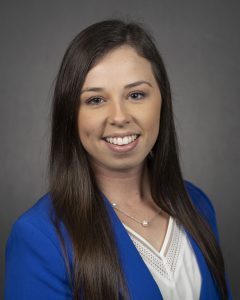
Jessica Wells, 4-H alumna and digital media coordinator for Florida Farm Bureau
The statewide goal of the Florida 4-H Program is to “prepare youth to become responsible citizens and productive members of the workforce.” This is accomplished by providing quality youth programs, opportunities for youth to explore their sparks, and connection between youth, adults, or peers that positively shapes a young person’s identity and encourages a growth mindset. Jessica Wells shares her 4-H story and how 4-H helped prepare her for her current job.
Jessica was a 4-H member in Washington County for eleven years. During that time, she participated in several different aspects of the 4-H program, beginning with her 4-H club. 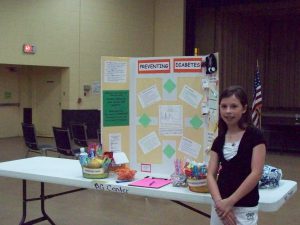
“My favorite 4-H project was the horse project. I was able to grow in my riding abilities and see my horse grow through the year. We were able to accomplish competing at the District level, but most importantly my horse and I were able to share a closer bond because of the time I spent working with him.”
However, Jessica’s involvement with 4-H didn’t stop with her horse club. Jessica was involved in nearly every aspect of the 4-H program. Jessica served as an advocate for her county program, and also served on the planning committee for the Northwest Teen Retreat at the district level. One of her favorite “beyond county” experiences was serving as a Florida 4-H State Executive Board Member.
“It was rewarding in every aspect. I grew so much more, I believe, because I was working with fellow 4-Her’s across the state to bring an amazing experience of state events to all 4-Her’s. Executive Board gave me more than fun memories and life experience, it gave me real, lifelong friendships.”
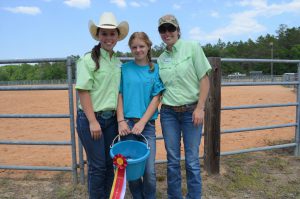
Jessica with one of her club members at a 4-H Horse Show
After graduation, Jessica decided to give back to the 4-H program as a club leader, and during her college years, she also worked for UF/IFAS Extension on campus in Gainesville.
“I was inspired to be a club leader because I wanted to share my passion for horses to youth in my county. 4-H is a wonderful organization that allows one to grow so many personal and lifelong skills while being hands-on with applicable activities. I wanted to use my passion to equip 4-Her’s to grow in their knowledge of horses while growing their public speaking, leadership, teamwork, personal confidence, and many other life skills.”
Today, Jessica serves as the digital media coordinator for Florida Farm Bureau. She credits 4-H with helping her prepare for this role. As a youth, volunteer, and former employee, she had opportunities to learn about leading teams, communication, planning events, and goal setting.
“I am so grateful for all the skills I was prepared with as a 4-Her that has carried into my current position at Florida Farm Bureau. Aside from the general office skills that often
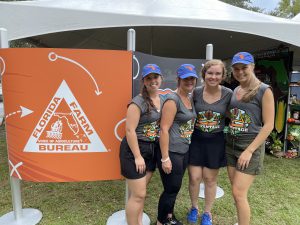
Jessica at a Florida Farm Bureau event
come to mind first, I daily use the management and administrative skills that I learned through 4-H. Through being organized in my projects, leading clubs, planning events, even events as large as horse shows, these different types of management skills prepared me for the daily tasks of a full time job. Like the meeting agenda I would create as a club officer, my current job requires creating simple meeting agendas to keep my co-workers and I on task. Something that small created a big foundation that I can do my job well on. And then on to preparing and leading workshops for my coworkers and other public audiences, again a skill I learned way back in 4-H. Having strong communication skills is vital in today’s work environment, maybe now more than ever. One can be great at the job they were hired for, but if they have great communication skills, it allows them to be even more valuable to their team. An individual does not acquire there skills overnight to use daily in the adult world, these skills are gained over a period of time and usually are rooted in their youth. I was able to gain these skills in my youth through this great organization of 4-H.
by Heather Kent | Sep 21, 2022

Sara as a young lady received a medal for her 4-H project.
In honor of National 4-H Week, we are sharing the stories of some of our alumni in the Florida Panhandle. Today, we highlight an alumna from Wakulla County! Sara Hillier grew up in Wakulla County, FL, and was active in the 4-H Program. She participated in the local Horse Club, as well as several other county 4-H programs. Sara enjoyed taking canoe trips to learn about natural resources in Wakulla County, and working with others to protect nature by picking up litter. Her favorite 4-H memory was attending summer camp at 4-H Camp Cherry Lake in Madison, FL. She remembers spending the week there with many of her friends and all nine of her first cousins. As a teenager, Sara served as a camp counselor at Cherry Lake.
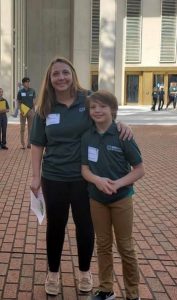
Sara is chaperoning 4-H Day at the Capitol
Sara knew that as soon as her own children were old enough, she wanted them to have many of these same experiences, so she enrolled all three of them in 4-H. Recently, Sara decided she wanted to pay it forward to the program she is so fond of, and made the switch from 4-H mom to 4-H volunteer. Today, Sara leads the Wakulla County Outdoor Adventures Club so she can share her spark for the great outdoors with the next generation. If you have knowledge, skills, or expertise, please consider sharing them through 4-H. We offer flexible opportunities to share your passion with today’s youth. If you are not familiar with 4-H, check out our 4-H Volunteer Welcome Packet for answers to frequently asked questions about becoming a volunteer and schedule a meeting with your local UF/IFAS 4-H Agent.
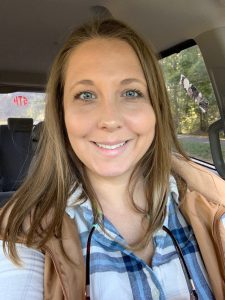
Today Sara is paying it forward by leading a 4-H Outdoor Adventure Club
by Heather Kent | Sep 21, 2022
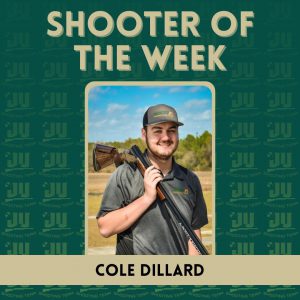
Cole as a sophomore at Jacksonville University, a member of the varsity shotgun team.
4-H allows young people to explore their sparks for learning. And through the process, young people learn valuable life skills that prepare them for work and/or college. But many people do not realize that 4-H can help young people secure cash for college or trade school! But college scholarships weren’t on Cole Dillard’s mind when he attended his first 4-H Shooting Sports club meeting. He just wanted to shoot skeet and become a better marksman. Cole joined the Sure Shots 4-H Club in Washington County when he was 10 years old and never looked back. Over the next eight years, he competed in 4-H and other shotgun competitions. He worked hard with his coaches to hone his skills and confidence. He also helped coach younger youth and served as the club president for two years. As a senior 4-Her, he was the Shotgun Individual HOA in 2020 at the Florida 4-H State Match. This earned him a spot to compete at the National 4-H Shooting Sports Match.
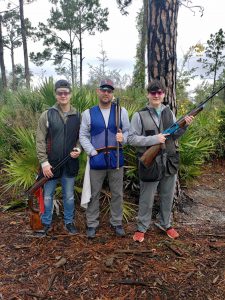
Cole with his brother Cass, and one of his 4-H Shotgun coaches
All that paid off when one of Cole’s coaches introduced him to the Jacksonville University advisor for the varsity shotgun team. After meeting the coach, touring the campus, and shooting with the other varsity members, Cole was offered a varsity scholarship to Jacksonville University as a member of their shotgun team. Today, Cole is finishing his sophomore year and majoring in aviation. His favorite clay target game is skeet, and he was recently named the Jacksonville University “Shooter of the Week.” You never know where exploring your 4-H sparks will take you in life- for Cole, it helped him turn his spark for shooting sports into cash for college!
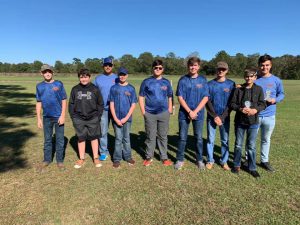
Cole with members of his 4-H Shotgun team, preparing for the state match in 2019
Cole’s story would not have been possible without the caring volunteers who coached him in 4-H Shooting Sports. They shared their passion for the sport so that he could explore his spark, which eventually led to his college scholarship. This is one example of the many ways our 4-H volunteers make a significant difference in the lives of young people. If you have knowledge, skills, or expertise, please consider sharing them through 4-H. We offer flexible opportunities to share your passion with today’s youth. If you are not familiar with 4-H, check out our 4-H Volunteer Welcome Packet for answers to frequently asked questions about becoming a volunteer and schedule a meeting with your local UF/IFAS 4-H Agent.
by Heather Kent | Sep 21, 2022
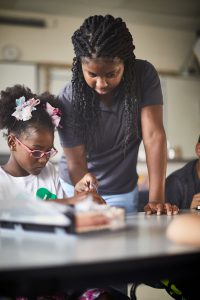
Photo By National 4-H Council
Positive youth development is an intentional process that promotes positive outcomes for youth by providing opportunities that build on young people’s strengths and fostering positive relationships with peers and caring adults (Youth.Gov, 2020). 4-H uses many different strategies to promote the healthy development of youth; but how do we know if positive youth development is really happening in our clubs and programs? One way to be confident that your club is nurturing opportunities for positive youth development is to look for signs that positive youth development is taking place. In the business and education realms, this is known as “continuous improvement.” Continuous improvement is using information (such as data, observation, or self-reflection) to improve the efficiency and effectiveness of an educational program or initiative (Clark et al., 2013). 4-H has been doing continuous improvement from the very start, when the 4-H Motto “make the best better” was adopted in 1920 (4-H History Preservation Program, 2010). Evaluating the 4-H program is a shared responsibility between faculty and staff and volunteers and helps us demonstrate the 4-H Motto to our members. While the evaluation of the total 4-H program tends to be more formal, volunteers can use feedback, self-reflection, and quality standards to continuously improve the programs so that youth can have the optimum positive youth development experience. This blog post offers three solid strategies to help 4-H professionals, volunteers, parents, and youth leaders continuously improve the 4-H groups or clubs they work with.
Feedback helps 4-H staff and volunteers close the gap between our current performance and desired performance (Pearson, 2016). Our desired performance is that 4-H experiences provide opportunities for youth to thrive while exploring their sparks in a safe environment, guided by a caring adult. Feedback should be relatively simple. You can solicit feedback from youth, parents or even other volunteers. One simple way to get feedback from younger youth is to have them complete the Clover Feedback Form. Youth can write or draw a picture about what they learned, what they would like to learn, what they enjoy about 4-H (how it makes them feel), and what they would change if they could.
Self-reflection is like feedback, but instead of asking others to describe what is (and isn’t) taking place 4-H staff and volunteers reflect on what worked well and what could be enhanced to encourage positive youth development in their club or program. Self-reflection can help 4-H professionals and volunteers reflect on what is working well and what can be improved. Some questions you might ask yourself include (adapted from Thiran, 2018):
- Is my reason for being a 4-H volunteer/youth leader the same now as it was when I started?
- Do I make myself accessible to my members, parents, and other volunteers?
- Do I seek input or feedback from my members and parents?
- If I were a 4-H member, how might I rate myself?
- Is my club/program vibrant? If not, why not?
The 4-H Quality Checklist is a simple tool to see if elements of positive youth development are taking place in your club or program. The checklist can help identify areas where your club is strong, as well as areas for improvement.
Taking time to check in with yourself, your members, and your parents can provide opportunities to apply our motto “Make the Best Better.” Leaders and 4-H professionals should set aside time at least annually to evaluate where the club or program is, and whether it is providing opportunities for youth to experience positive youth development. After spending some time thinking about continuous improvement for your club or program, discuss your findings with your local 4-H professional.
References:
- Clark, S., Hironaka, S., Carver, P., & Nordstrom, L. (2013). Continuous improvement in education [white paper]. Carnegie Foundation for the Advancement of Teaching. https://www.carnegiefoundation.org/wp-content/uploads/2014/09/carnegie-foundation_continuous-improvement_2013.05.pdf.
- 4-H History Preservation Program. (2010). 4-H Motto, Creed, and Pledge. https://4-hhistorypreservation.com/History/M-C-P/.
- Pearson. (2016). Providing Educational Feedback [white paper]. Higher Education Services. https://www.pearson.com/content/dam/one-dot-com/one-dot-com/us/en/pearson-ed/downloads/Feedback.pdf.
- Thiran, R. (2018). 5 Self-Reflection Questions Leaders Should Ask Themselves. Leaderonomics.com. https://www.leaderonomics.com/articles/leadership/5-self-reflection-questions.
- Youth.Gov. (2021, March 10). Positive youth development. Youth.Gov. https://youth.gov/youth-topics/positive-youth-development.
 in January of 2020, just before the COVID-19 pandemic started. This is just one of the few hurdles that I had to jump over and just kept running. With everything switching to a virtual format, I worked with other agents from all over Florida to help create the Virtual Poultry and Rabbit Summer Camp and the Florida Virtual Ag Judging Contest. Both of these programs have been very successful and I have enjoyed watching them grow. This job has been super rewarding and I love getting to work with the youth and volunteers in my community.
in January of 2020, just before the COVID-19 pandemic started. This is just one of the few hurdles that I had to jump over and just kept running. With everything switching to a virtual format, I worked with other agents from all over Florida to help create the Virtual Poultry and Rabbit Summer Camp and the Florida Virtual Ag Judging Contest. Both of these programs have been very successful and I have enjoyed watching them grow. This job has been super rewarding and I love getting to work with the youth and volunteers in my community. 4-H has been my home since I was 8 years old. During my life as a 4-H youth I showed rabbits, chickens, and steers in the Livestock Club and competed in livestock judging and public speaking contest. I also attended Camp Timpoochee and Horse Camp during the Summer as a camp counselor. After graduating from the Gadsden County 4-H Program, I continued to help out the Livestock Club at the North Florida Fair and at the West Florida Livestock Show. Little did I know that I would one day become the 4-H Agent in my county.
4-H has been my home since I was 8 years old. During my life as a 4-H youth I showed rabbits, chickens, and steers in the Livestock Club and competed in livestock judging and public speaking contest. I also attended Camp Timpoochee and Horse Camp during the Summer as a camp counselor. After graduating from the Gadsden County 4-H Program, I continued to help out the Livestock Club at the North Florida Fair and at the West Florida Livestock Show. Little did I know that I would one day become the 4-H Agent in my county.

















